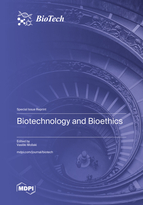Biotechnology and Bioethics
A special issue of BioTech (ISSN 2673-6284). This special issue belongs to the section "Biotechnology Regulation".
Deadline for manuscript submissions: closed (30 April 2023) | Viewed by 49493
Special Issue Editor
Special Issue Information
Dear Colleagues,
Biotechnology has provided scientific advancements which can be applied to a wide range of other fields including medicine, agriculture, and environmental science. Advanced therapies, genetically modified organisms (GMOs), genome-editing technologies such as CRISPR, and synthetic organisms are just a few examples of biotechnological applications with a high scientific impact. In parallel with their advantages and utility, these applications have raised—and continue to raise—major ethical, legal, and social implications. Over the last few decades, more traditional but also novel biotechnological advancements have generated vivid debates on ethical dilemmas, which in certain cases had an impact on developing national or international policies.
This Special Issue will focus on the ethical, legal, and societal concerns raised by applications of biotechnology. Colleagues from multiple disciplines including biosciences, medicine, law, and philosophy are invited to submit contributions including (but not limited to) the following issues:
Genome-editing technologies, GMOs, advanced therapies (e.g., stem cell and gene therapies), synthetic biology, nanotechnology, 3D bioprinting, patents in biotechnology, and biosafety.
We welcome the following article types: original research articles, reviews, and opinions.
Dr. Vasiliki Mollaki
Guest Editor
Manuscript Submission Information
Manuscripts should be submitted online at www.mdpi.com by registering and logging in to this website. Once you are registered, click here to go to the submission form. Manuscripts can be submitted until the deadline. All submissions that pass pre-check are peer-reviewed. Accepted papers will be published continuously in the journal (as soon as accepted) and will be listed together on the special issue website. Research articles, review articles as well as short communications are invited. For planned papers, a title and short abstract (about 100 words) can be sent to the Editorial Office for announcement on this website.
Submitted manuscripts should not have been published previously, nor be under consideration for publication elsewhere (except conference proceedings papers). All manuscripts are thoroughly refereed through a single-blind peer-review process. A guide for authors and other relevant information for submission of manuscripts is available on the Instructions for Authors page. BioTech is an international peer-reviewed open access quarterly journal published by MDPI.
Please visit the Instructions for Authors page before submitting a manuscript. The Article Processing Charge (APC) for publication in this open access journal is 1600 CHF (Swiss Francs). Submitted papers should be well formatted and use good English. Authors may use MDPI's English editing service prior to publication or during author revisions.
Keywords
- Biotechnology
- Ethics
- Legal implications
- Social implications
- Genome editing
- GMOs
- Cell and gene therapies
- Synthetic biology
- Biosafety
- Policy







